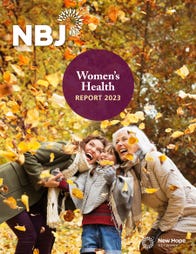
Imagine ignoring a cohort that spends more than $2 trillion on products and services in your category every year. That would be crazy, right?
It would, and that’s exactly what healthcare companies—including supplement brands—have been doing for years. Women control the healthcare spend for both themselves and their families, but they’ve been forced to settle for dietary supplements formulated for and tested on men or, worse, “shrink it and pink it” versions in which only the packaging and marketing have changed.
Supplement brands that continue to ignore women’s needs are falling behind. Not only do women make up half the population, but they’re informed consumers who are proactive about their health and more open than men to alternative and complementary therapies. And according to a recent Nutrition Business Journal (NBJ) survey, nearly 70% are more likely to buy formulations designed specifically for the female body.
In the just-released, first-ever Women’s Health Report, NBJ takes a look at this blossoming market. Women are eager for what the supplement industry has to offer, and the industry is responding with solutions to ease the symptoms of PMS and menopause and address vaginal health—conditions once considered too risqué to discuss in public and still subject to advertising bans on Facebook. Smart brands are also targeting women with solutions for mood, mental health and stress management, top concerns for about half of all women.
Some categories within the women’s health market are seeing more progress than others. Multivitamins continue to dominate, especially among baby boomers and Gen X women (Gen Zers still need a little convincing). But probiotics are the ingredient to watch, growing faster than any other ingredient within women’s general health at 6.8% this year, according to NBJ projections.
New products addressing menopause and perimenopause are proliferating, growing by 4.8% in 2022, even as the rest of the supplement industry continues to languish in post-pandemic doldrums. NBJ projects growth in supplements aimed at treating menopause symptoms to tick up steadily, reaching 5.6% in 2025. As Gen X celebrities, from Drew Barrymore to Michelle Obama, talk openly about their experiences with menopause and Gen Z influencers track their periods on TikTok, the stigma around women’s life stages is finally subsiding—and products aimed at relieving their symptoms are no longer relegated to dusty back corners on retail shelves.
The women’s health market presents enormous opportunities. For brands willing to wake up from history, they’re right here, right now.

For more insights into the women’s health market, purchase the 2023 Nutrition Business Journal Women’s Health Report.
Read more about:
J.E.D.I.About the Author(s)
You May Also Like





